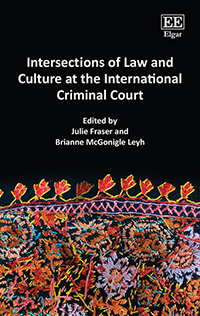This month’s Spotlight is contributed by Language, Culture and Justice Hub members Julie Fraser and Brianne McGonigle Leyh of Utrecht University.
We are pleased to present our new edited volume Intersections of Law and Culture at the International Criminal Court, published in October by Edward Elgar Press. This book takes as a premise that notions of culture affect the legal foundations, daily functioning, and perceived legitimacy of the International Criminal Court (ICC). Culture is sometimes explicitly raised at the Court, for example when prosecuting the destruction of cultural property as a war crime or when the accused seeks to raise a “cultural defence.” However, we had identified myriad ways in which “culture” goes unobserved in the work of the ICC, ways which had, to date, escaped thorough academic attention. We have both worked at the Court and addressed international criminal law in our scholarship. In our book, we endeavored to expose and analyse the cultural complexities inherent in international criminal law.
Gladly, we were able to gather together a range of leading scholars and legal practitioners to contribute to the volume. The chapter authors all take a multidisciplinary approach to challenge the view that international law is not limited or bound by a particular culture, arguing instead that law and culture are intertwined. Analysing how culture influences views of the law, the facts to which it applies, and the fairness of the outcome, the contributors consider the implications of culture and law for the ICC and its international reach. McGonigle notes that “Each of the chapters touches on different issues that arise when scholars begin to unpack the crucial ways in which law and culture are so intimately intertwined, from questions about language to interviewing witnesses in court as well as broader issues of legitimacy.” For example, the important empirical chapter contributed by Hub member and IJIN editor Leigh Swigart highlights the inherent but often overlooked role of “culture” as manifested in language at the ICC.
The first section of the book looks at culture in relation to the Court’s core crimes, while the second section focuses on its role in the courtroom. Here authors analyse how specific cultural beliefs of the accused and witnesses are addressed in court, and the influence of culture in the judges’ decision-making processes. The third section focuses on intersections of culture vis-à-vis defences, sentencing, and victim participation. The final section tackles the Court’s (lack of) cultural legitimacy around the world, including across Asia, Africa, the Islamic world, and the USA. In the book we put forward recommendations to aid the Court’s future considerations, ideally making it beneficial for legal practitioners and civil society organisations.
The introduction to the book is freely available.
